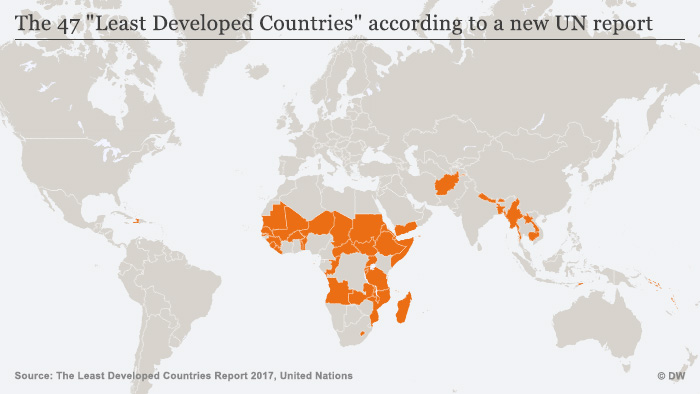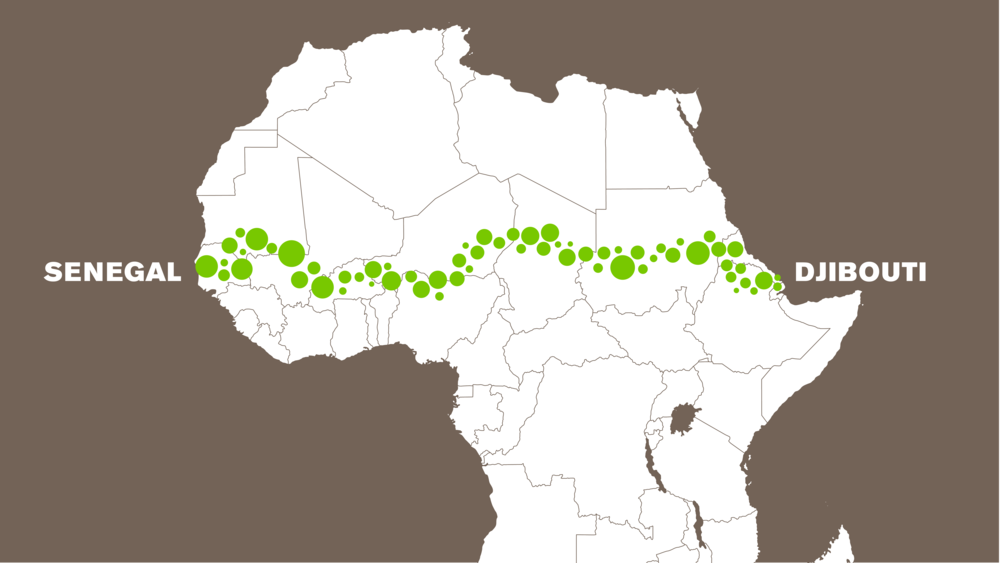Nearly two dozen African nations are now committed to build and maintain the “Great Green Wall,” a chain of forests and woodlands spreading across the entire continent at the southern edge of the Sahara Desert, in the region known as the Sahel. Initially launched in 2007 by 11 countries, the initiative has now been joined by ten more. It is considered the world’s largest ecosystem restoration project by the UN Environment Programme.
The project aims to address many of the continent’s core challenges at once. Most directly, it provides a physical barrier to ward off the spread of the Sahara. The Sahara has been moving gradually south for millennia, encroaching on and disrupting local livelihoods. However climate change has accelerated this process, creating a major economic and environmental threat to the nations of the Sahel, many of which are already among the world’s poorest and least developed.

The wall will reclaim 247 million acres of land by the year 2030, which can then be used for more economically productive purposes like agriculture and livestock. More trees will result in more rainfall being diverted back into the land, and therefore more water available to communities and ecosystems. The new trees will capture around 250 million metric tons of carbon ever year, roughly equivalent to removing all of California’s cars from the road for more than three year. The process of planting and maintaining the wall will also create hundreds of thousands of jobs over the course of the next several years.
It’s a win-win-win-win!
The effort is estimated to cost $8 billion USD and be completed by 2030. It is currently about 15% complete.
I love projects like these. They just make so much sense. They provide incredible economic bang for their buck, ensuring the sustainability of livelihoods for decades, while also employing people in the process and offering a critical solution to the climate crisis. But more than that, they demonstrate the importance and viability of international cooperation at a time when nearly all of humanity’s deepest challenges are trans-boundary, requiring us to collaborate with one another, even to re-envision ourselves as all part of the same team.
What other major development projects might we be able to make a reality if more countries acknowledged their shared challenges and pooled their resources together toward a common goal?




How are they planning to stop the local residences from cutting down every bush and tree for fire wood to cook with?
I hope part of the jobs this will create will be a highly trained sophisticated team of Forest Rangers patrolling portions of the wall from East to West. We should even use single winged aircraft to monitor the length and breadth of this wall. And of course this should be included in school curriculum starting with all elementary school through secondary students. Some places must be used as cattle and goat ranches for ranchers.
That’s an excellent question….
Maybe the planting of more trees will be necessary, or maybe the path will not go through residential areas?? Right now we have to focus on the positives and not try to bring negative energy to the project. It’s an excellent initiative.
CLEVELAND NATIONAL PEACE PLAN
Building the National Coast-to-Coast ‘Great American Peace Trail’ to Stem the Violence in America’s Youth and Unite America https://theicea.com/page33
The Science behind Peace and Global Harmony is the “Theory of Iceality on Environmental Arts”. Developed in 1987, it is the practical study on the aesthetics of the relationship between Humans and their Environment through Arts and Culture and Design Technology, ultimately promoting an effective sustainable global Culture of Peace between all Living Things ~ Human, Plant and Wildlife Kingdoms ~ All the Worlds Children!
The incorporation of the rights of flora and fauna in a “Universal Peace Equation” for the Worlds Children Peace monument (WCPM) at EXPO 2000, the Worlds Fair held in Hanover, Germany was the first major change in achieving a sustainable global Culture Peace on Earth in over 2000 Years.
How is the plan???
I’m curious to know where the water will come from? I thought the ground water was also very deep and sparse too?
Nice work, lets keep the movement on, Can we partner with you or your organization, team or individuals tackling climate change. We’re from Uganda East Africa.
Hello Dear,
Please help us with seedlings and trees to plant 1 million trees as we had modslide that killed thousand of people.
SisTec was established in 2007 by Elongima Bundu and patriotic Sierra Leoneans who had studied at Njala University College and had their qualifications in Computer Science, Electronic and Telecommunication. Would enhance to see mainly students and youth participate in the development of Sierra Leone through Information Communication & Technology and School Tree Planting Education.
It was our initiative and passion Publishing series of blog post, videos and live interviews so that our team will investigate the sustainability of aluminum cans. Kindly follow our campiage this month as we review product lifecycles, speak to local experts and compare cans to other packaging alternatives.
Plastic pollution, in particular, has an extreme negative environmental consequences. It is my believe that SisTec Sierra Leone team can reduce their impact by making better purchase decisions and by supporting recycling activities usually evaluating and selecting least Barry materials is not always very clear. The frequent flooding is just one of such glaring examples of it’s impact.
We need toiletries, 1 million fruit trees and tools to help young people carry out such an environmental campaign, with strict adherence to covid-19 public health consideration.
I strongly believe that you can help us with this facilities.
Kind regards,
Elongima Bundu
SisTec
Founder & CEO
+23276514903
Hi,
Sierra Leone is one of the region that is greatly affected by diasater. We are requesting for two million seedlings, tools, refreshments, transportation refund, media etc to help five districts that is greatly affected by the modslide. Freetown, Moyamba, Portloko and Pujehun.
SisTec was established in 2007 by Elongima Bundu and patriotic Sierra Leoneans who had studied at Njala University College and had their qualifications in Computer Science, Electronic and Telecommunication. Would enhance to see mainly students and youth participate in the development of Sierra Leone through Information Communication & Technology and School Tree Planting Education.
It was our initiative and passion Publishing series of blog post, videos and live interviews so that our team will investigate the sustainability of aluminum cans. Kindly follow our campiage this month as we review product lifecycles, speak to local experts and compare cans to other packaging alternatives.
Plastic pollution, in particular, has an extreme negative environmental consequences. It is my believe that SisTec Sierra Leone team can reduce their impact by making better purchase decisions and by supporting recycling activities usually evaluating and selecting least Barry materials is not always very clear. The frequent flooding is just one of such glaring examples of it’s impact.
We need toiletries, 1 million fruit trees and tools to help young people carry out such an environmental campaign, with strict adherence to covid-19 public health consideration.
I strongly believe that you can help us with this facilities.
Kind regards,
Elongima Bundu
SisTec
Founder & CEO
+23276514903